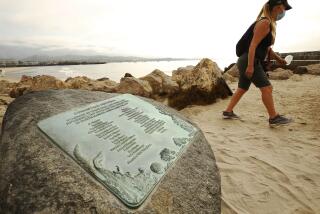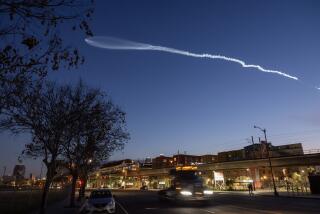Base Workers Informed of Safety Issues Days Before Air Show Crash
Days before a fatal jet crash at the Point Mugu Air Show, Navy officials notified base employees that they had found “a significant number of performance deficiencies and safety discrepancies” in the aircraft’s maintenance division.
Last week, Navy officials said that similar problems uncovered in the QF-4 Phantom jet’s maintenance program during a routine 1999 inspection had been corrected. The inspector’s highly critical report warned of potential safety hazards.
If problems are not addressed, the inspector said at the time, “they will have a devastating impact on the safety of air crew and aircraft worthiness in the future.”
Despite assurances that improvements had been made, Navy officials informed Point Mugu employees about continuing problems with the QF-4 jet program in a memo included in a worker survey distributed earlier this month. The survey included 23 questions that covered everything from worker skill levels and training to inquiries about the program’s overall safety.
“What are some of the things that are preventing the QF-4 maintenance team from performing as well as it might?” was one question posed to employees in the survey obtained by The Times.
Another question: “What is your level of confidence that the work performed by QF-4 maintenance ensures the safety of the QF-4 crew members and aircraft?”
After recent reviews, the survey stated, the base’s command staff “is now faced with the difficult decision of determining whether the QF-4 maintenance group is capable of achieving the standards of performance for safety of flight, aircraft availability and productivity that must be met to ensure its continued existence,” according to the memo.
Navy officials confirmed Monday that an employee survey was conducted earlier this month at the Ventura County base, but said it was part of an ongoing financial and operations audit and was not solely focused on the QF-4 squadron’s maintenance division. They declined further comment about the survey and the investigation.
Meanwhile, Navy spokeswoman Cathy Partusch said the safety record of the QF-4 squadron is stellar, noting that the air show crash was the only in-flight accident the fleet has experienced in 118,000 hours logged in the air. There are 20-plus planes in the squadron.
“The Navy is always looking to make sure that we do everything safely,” Partusch said. “Safety is our No. 1 goal.”
Rep. Elton Gallegly (R-Simi Valley) said Monday he sent a letter to Capt. Jim Rainwater, the base commander, requesting a meeting about allegations of problems with the QF-4 jet program. But Gallegly said he maintains complete confidence in Rainwater and other members of the base’s command staff.
“The fact that I sent a letter in no way means I want to impede on an impartial investigation into this tragedy,” Gallegly said. “The purpose is to follow up on some serious allegations.”
Although the cause of the April 20 air show accident that killed two aviators has not been determined, investigators have not ruled out faulty maintenance, pilot error or mechanical malfunction.
One civilian employee in the QF-4 hangar said Monday that the Navy’s recent survey was not taken seriously because it only vaguely addressed safety concerns well-known among many in the squadron. The employee received the survey two days before the air show accident.
“To me, it was just more smoke and mirrors,” said the worker, who spoke on condition of anonymity. “They still hadn’t addressed the problem and here is another report. It was like, here they come again. They ask you all these questions and they want you to talk your heart out, but they don’t do anything.”
The employee survey did not mention specific maintenance problems with the QF-4 jet program. Navy officials also reiterated that the survey was part of an ongoing audit and is not evidence of serious problems that could have led to the air show crash.
They also pointed out that the jet involved in the accident was delivered to Point Mugu in February from the Naval Aviation Depot in North Carolina.
Navy Lt. Cmdr. Michael Norman, 39, of Camarillo and Marine Capt. Andrew Muhs, 31, who lived on the base, were killed when their jet wobbled out of control and slammed into a marshy field during the air show.
Last week, two former Navy aircraft specialists said they warned officials last summer that the maintenance program for the Vietnam-era fighter jet was plagued with problems that could jeopardize the safety of air crews.
Darrell Ellington, a mechanic on the QF-4 Phantoms, and Ken Okesson, a quality assurance specialist, said they made their concerns known to base officials in resignation letters and confidential exit interviews.
Another Navy spokeswoman said last week that the Navy took the two workers’ concerns seriously but that “there were no specific allegations cited upon which to act.”
Ellington and Okesson’s warnings echoed the concerns of a Navy inspector who two years earlier issued a highly critical report of Point Mugu’s civilian-operated QF-4 program. The report was part of a regular annual inspection.
The inspector’s evaluation of the QF-4’s quality assurance program cited major problems with auditing procedures, maintenance record keeping and overall management.
Maintenance is “beginning to demonstrate tendencies of straying from the straight and narrow paths required ... to ensure safe and efficient aircraft,” Lt. Cmdr. Gary Green wrote in his report.
Green noted that he was especially concerned about poor record keeping in the QF-4 maintenance division. “The neglect of this area over the past months has resulted in a combination of discrepancies that if not corrected could lead to possible loss of life, equipment and weapon systems.”
More to Read
Inside the business of entertainment
The Wide Shot brings you news, analysis and insights on everything from streaming wars to production — and what it all means for the future.
You may occasionally receive promotional content from the Los Angeles Times.










